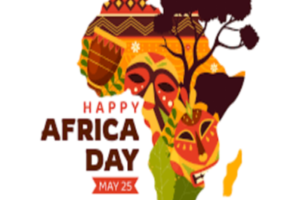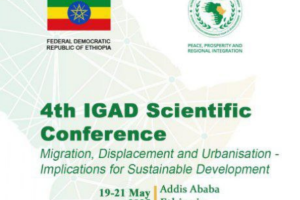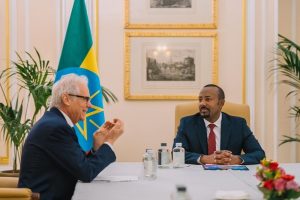
After the two-year war between the federal government and the Tigray Peoples’ Front (TPLF), the two parties have come to end their conflict by agreeing on the lasting peace through a permanent cessation of hostilities under an AU brokered agreement. The accord was signed on 2nd of November 2022 in Pretoria, South Africa.
The economic, political, and social foundations of the country have been tested and the nation proofed its solidarity and power to overcome any hurdle. The people have shown its solid support for the country in such defining times.
Since the agreement was made between the two actors, the Ethiopian government made crucial efforts to put the agreement in to action. It has always been showing its commitment to act upon the actions listed in the accord. Besides, responsible stakeholders are also working with the government to ensure its implementation.
On top of that, it is a fact that the conflict has pulled numerous attentions around the world as many nations and organizations wanted to get involved in the peace process. On the other hand, Ethiopia has shown its stiff stance in welcoming an AU brokered agreement only.
The government of Ethiopia, during that time, has reflected its true stand of pan Africanism by providing the chance particularly to the African Union (AU) to solve the matter through African solution. The incumbent has expressed its desire to bring the continental bloc to take part in the resolution process so that the country has reflected its demand to solve African problems with African solutions.
With all the efforts done by the current incumbent, the AU representatives, along with other stakeholders, the peace accord has been implementing in the country as all parties play their role in better ways. The government has been committed to exert all its power to make the accord to be operational so that the nation will be in great triumph regarding its economic, political, and social aspects. It is also showing its commitment to go all the way with the Pretoria Agreement.
Similarly, involved actors, at this time, are working on implementing the Disarmament, Demobilization, and Reintegration (DDR) process. The process, based on multiple documents, is a comprehensive reversal of war conditions to peace amongst belligerents and brings about peaceful conditions; enhance human security, stability, and development through transforming the role and posture of armed combatants.
According to a document from African Union, DDR is a complex and multi-faceted but highly political process that is typically, initiated following the cessation of armed conflict. It is also linked to the broader process of Security, Sector Reform (SSR), a phenomenon that motivates for the restructuring, re-orientation, and professionalization of security related institutions to embrace transparency and democratic culture.
DDR is therefore shaped by the historical, socio-economic, geographic, cultural, and ethnical factors, the nature of the armed conflict, and the manner in which the armed conflict was concluded. In some cases, as to the document, it is the parallel introduction of transitional justice (TJ).
Talking about Africa’s experience over the past three decades, as to the document, DDR programs in Africa have had mixed results. Since the early 1990s, the United Nations had been highly involved in DDR programs globally. Since 1992, of the twenty four DDR related programs that the UN got involved, 81 percent of them are in African continent. In each DDR process in Africa, as to the document, some have been innovative and remarkably successful as was in the case of Ethiopia, Eritrea, Angola, and Uganda.
To this end, the Ethiopia’s government has been expressing its full support for the implementation of actions that are drawn from the peace accord. Ethiopia, indeed, benefits from the peace accord, and AU brokered agreement. The nation has also voiced its stance regarding the accord through its diplomats and government officials. In additions, the country proves its commitment through every action it performs for the realization of the accord.
Just a week ago, Ministry of Foreign Affairs of Ethiopia reported that Ambassador Taye Atske-Selassie, Minister of Foreign Affairs of Ethiopia, received the African Union Commissioner for Political Affairs, Peace and Security, Ambassador Bankole Adoye. Ambassador Taye affirmed that the Ethiopian government has been fully committed to the implementation of the Pretoria Peace Agreement.
Commissioner Bankole commended the implementation of the Pretoria Peace Agreement. With this inline he reiterated the AU’s commitment to implementing the Ethiopian peace process, recalling that Ethiopia was the first country to benefit from the AU Peace Fund, receiving one million US dollars in support of its DDR process. In addition, he recalled that the Union has successfully deployed the full team of the AU Monitoring, Verification and Compliance Mission (AU-MVCM). He also added that the African Union will continue to support the implementation of the transitional justice policy framework in Ethiopia.
The two sides held a wide-ranging discussion on important issues of peace and security in the Horn of Africa. Ambassador Bankole noted that Ethiopia is a formidable and effective partner in the peace-making efforts in the Horn of Africa and he underscored African Union’s commitment to continue strengthening its joint work with Ethiopia.
By the same token, a number of countries and organizations, including nations’ representatives have been working on supporting the peace accord to come to reality. To this end, the ministry also announced that Ambassador Mesganu Arga, MoFA State Minister, met with U.S. Special Envoy for the Horn of Africa (HoA) Mike Hammer. As to the report, It was learnt that on the occasion both discussed the Disarmament, Demobilization, and Reintegration (DDR) process and the implementation of the Pretoria Peace Agreement.
The two officials underlined the need for international-level support for the DDR process and for the successful implementation of the Pretoria Peace Agreement.” Amb. Mesganu, moreover, emphasized the need for renewed structural engagement between the two countries to further scale up relations.
BY DANIEL ALEMAYEHU
THE ETHIOPIAN HERALD WEDNESDAY 22 MAY 2024




